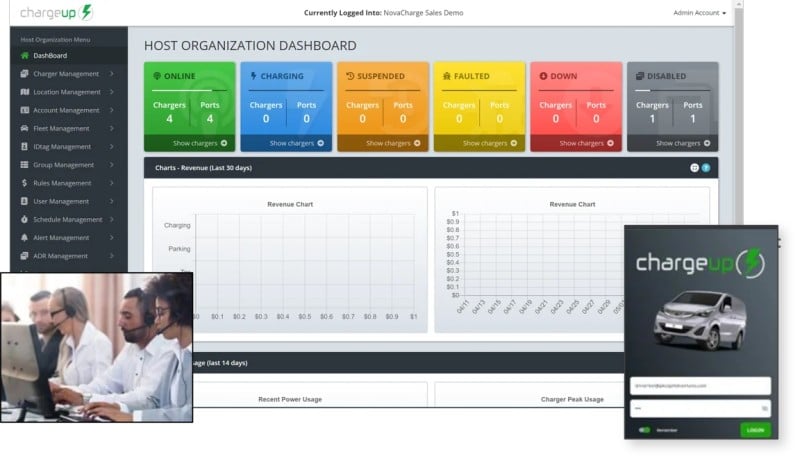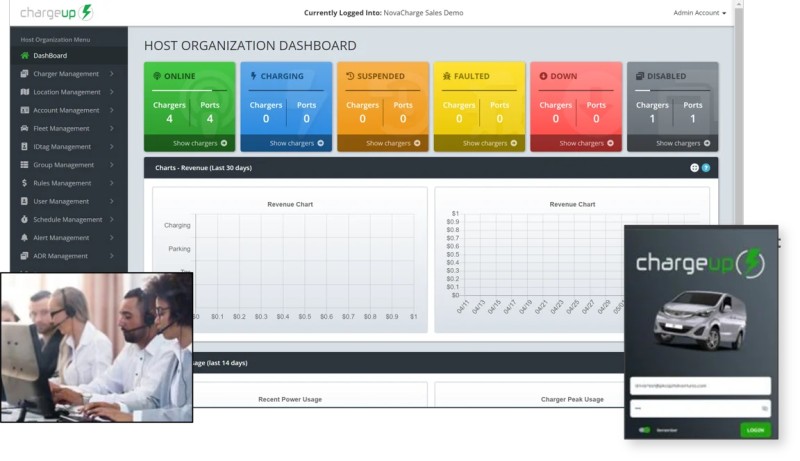Commercial EV Charging Station Reporting: The Role of Your CPMS
Feb 12, 2024 | 7 MIN READ
 KPI’s. Metrics. Dashboards. When it comes to business and supporting or evaluating initiatives, being able to effectively communicate the metrics that matter and the data that drives decisions is vital. Commercial EV charging stations, for that reason, must be viewed as any other business initiative. A charging platform management system (CPMS) must be able to assist station owners and hosts when it comes to reporting on the essential data that can help inform future investment.
KPI’s. Metrics. Dashboards. When it comes to business and supporting or evaluating initiatives, being able to effectively communicate the metrics that matter and the data that drives decisions is vital. Commercial EV charging stations, for that reason, must be viewed as any other business initiative. A charging platform management system (CPMS) must be able to assist station owners and hosts when it comes to reporting on the essential data that can help inform future investment.
Quick Links
- Why Reporting Matters for Commercial EV Charging Stations
- Types of Reports for Commercial EV Charging Stations
- How Data-Driven Decisions Improve Commercial EV Charging Stations
Why Reporting Matters for Commercial EV Charging Stations
Plain and simple, reporting plays a pivotal role in the efficient operation and management of commercial EV charging stations. For fleet managers and other businesses invested in the EV infrastructure, understanding usage patterns, energy consumption, and revenue generation of their commercial EV charging stations is paramount. Robust and flexible reporting features provide invaluable insights to help drive strategic decision-making, optimize resource allocation, and enhance customer experience.
First and foremost, one of the primary questions commercial EV charging station owners have is whether or not the stations are being used and, if so, how much. Reporting provides visibility into charging frequency, duration, and peak usage times, which allows businesses to identify trends and adjust their operational strategies, and fee structures, accordingly.
Equally important for many is the ability to balance power loads and enact effective energy management. Monitoring energy consumption, in real-time, and analyzing historical data, helps identify inefficiencies, optimize charging schedules, and implement energy and cost-saving measures. If reducing operational costs and achieving sustainability goals are priorities, this data can help achieve those goals.
Finally, many commercial EV charging station owners are looking to increase or create revenue. Charging station reporting helps track revenue generation, transaction volumes, and pricing strategies. That data can, then, help businesses adjust policies and operations to improve the profitability of their charging infrastructure.
And, if a business is including EV charging as part of employee compensation or other costs of business, detailed reporting is essential. Further, it can help improve the transparency of the billing and invoicing processes. When it comes to any business investment, tracking the financials is paramount and that comes down to the flexibility of your Electric Vehicle (EV) CPMS.
 Types of Reports for Commercial EV Charging Stations
Types of Reports for Commercial EV Charging Stations
We’ve hinted at a few of the reports EV charging station owners and hosts may be looking for in a CPMS, but let’s take a closer look at what reports are available through your CPMS. However, it’s worth noting that, as we’ve discussed before, not all charging platform management systems are the same (or created equal).
Still, there are a few standard reports a CPMS should be able to provide and, with the right CPMS, these can be automated, modified, and tailored to your needs.
Here's a detailed list of the kinds of reports that an EV CPMS can generate or show:
1. Charging Sessions - How much use are your EV charging stations receiving? This report provides a summary of all charging sessions within a specified time frame, including start time, end time, duration, kWh consumed, and cost.
2. User Activity - If you’re wondering who is using your charging stations, you can see an overview of user interactions with the EV CPMS, including user logins, charging sessions initiated, payments made, and more. This can be incredibly useful if looking to incentivize usage or create hybrid fee structures for certain users.3. Revenue - For many commercial EV charging station owners, increased revenue is a goal. Get a breakdown of revenue generated through charging sessions and can differentiate between revenue types with this report.
4. Energy Consumption - When it comes to understanding how and where you can grow an EV charging program, understanding energy consumption is paramount. This report provides an analysis of electricity consumption by charging stations to help identify peak usage times and average consumption rates.
5. Station Utilization - Wondering where you need additional stations? Which stations you can incentivize? With this report, you can track the usage of individual charging stations helping to identify high-demand stations, potential bottlenecks, and areas for expansion.
6. Network Performance - EV charging station reliability is a huge concern. With this report, you can track data regarding the overall performance and uptime of the charging network as well as monitoring downtime, maintenance needs, and system reliability.
7. Fault and Error Log - Reports on any technical issues and errors encountered by charging stations which facilitates proactive maintenance and troubleshooting. NovaCHARGE customers can leverage NovaBOT to handle many of these level 1 issues.
8. User Feedback Report - Wondering how EV drivers feel about the charging experience? Collect that data through the charging app and see a summary of user feedback and ratings for the charging experience. This can help identify areas for improvement and customer satisfaction levels.
9. Environmental Impact - If sustainability and carbon footprint reduction is a goal of your EV charging program, this can help you calculate the carbon footprint reduction achieved through EV charging station utilization by estimating emissions saved compared to traditional gasoline vehicles.
10. Billing and Invoicing - EV charging programs and EV charging parking passes used by some businesses can track the invoice histories and payments made by users.
11. Compliance and Regulatory Reports - For some industries and businesses, like those with EV fleets, there is a need to adhere to local and, in some cases, federal regulations. These reports help businesses document compliance with EV charging laws or emission regulations.
12. Custom Reports - Out of the box reports don’t alway provide what you need. A robust CPMS will allow you to create custom tailored reports based on specific user requirements and could, potentially, include insights on regional trends, fleet usage, or special events.
Having a complete and transparent view into your commercial EV charging stations not only helps you address current demands but also prepare for the future. Further, reports can help you address concerns and make proactive, data driven decisions regarding your EV charging program.
 How Data-Driven Decisions Improve Commercial EV Charging Stations
How Data-Driven Decisions Improve Commercial EV Charging Stations
There is no business out there today who isn’t looking to leverage data to make better, smarter, more strategic decisions. Owners of commercial EV charging stations should be no different. Perhaps, most importantly, when it comes to understanding EV charging ROI, there’s no better way to see the impact of charging stations than leveraging the reporting features in your CPMS.
Obviously, for many, the first, and most important question, is related to demand and utilization. Data analytics can provide invaluable insights into usage patterns and trends. A quick look at historical charging data can help commercial EV charging station owners not only determine how to set fee schedules based on peak usage hours or even popular charging locations, but it can also help optimize their growth.
More specifically, with utilization data, businesses can optimize their station placement, ensuring there are enough chargers at those high-demand locations, and adjust pricing strategies to maximize revenue during peak hours.
As noted earlier, and in previous blogs, EV charging station reliability issues can limit not only charging station utilization but also EV adoption and demand for EV infrastructure. Monitoring charging equipment, in real-time, means you can identify and proactively handle potential issues before they escalate into costly downtime. Proactive maintenance monitoring, like NovaCHARGE’s AI driven NovaBOT, can help reduce maintenance costs and enhance customer satisfaction by minimizing the likelihood of encountering out-of-service chargers.
If you’re considering a program tailored to your campus (both healthcare and education) or workplace EV charging, then being able to track user data is essential. The same is true for municipalities and EV fleet operations which may require EV charging on-site at a depot or at charging facilities located throughout the region they serve.
Tracking user preferences and behaviors means you can tailor promotional offers, loyalty programs, and charging recommendations for individual users. This personalized approach fosters customer loyalty and encourages repeat business, ultimately driving revenue growth for commercial EV charging stations.
Finally, data-driven insights play a pivotal role in EV infrastructure planning and expansion. Charging patterns and demand forecasts help businesses strategically deploy additional charging stations in high-traffic areas, alleviating congestion and accommodating the growing EV market. One goal of public and commercial EV charging programs is scalability and data driven insights ensure scaling happens when and where needed (and profitable).
All of this data is great, but getting it takes a CPMS and EVSE provider capable of providing the data you do need. That means tailored reports that speak directly to your needs and the needs of the EV drivers you’re serving.
When NovaCHARGE built ChargeUP, our CPMS and mobile app, we did so with both station owners and drivers in mind. We built them with the power to deliver the data that helps you make strategic decisions to meet driver demand and deliver ROI.
If you’re ready to talk to our team about how our commercial EV charging systems and best-in-breed CPMS, ChargeUP, can help you build a successful and scalable EV charging program, get in touch!
